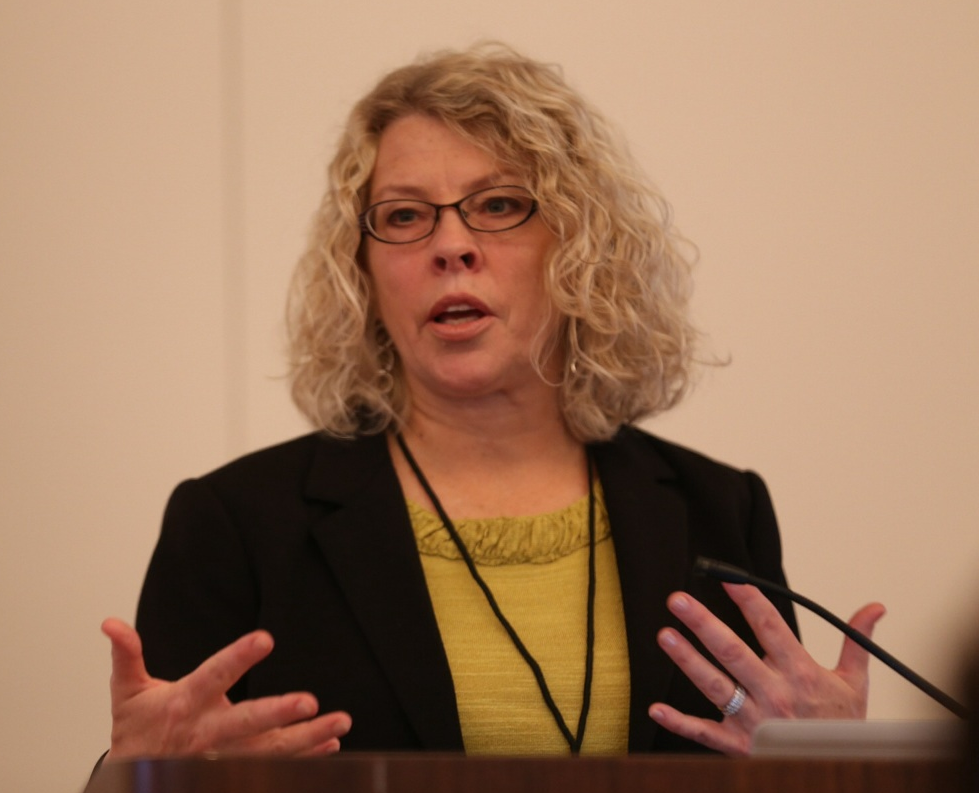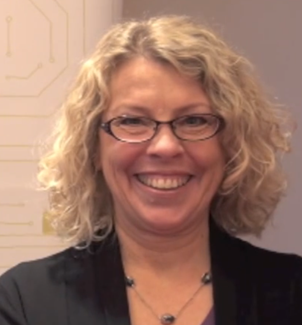On January 24, the Joan Ganz Cooney Center released the results of a national survey of more than 1500 parents of children ages 2-10, and their perceptions of educational media use at home. Read on for slides from the Learning at Home Forum last week and highlights from the report.
Getting ready for the #familiesandmedia event hosted by the @CooneyCenter http://t.co/bSvFkRkOYu pic.twitter.com/k5CTUV1qvq
— Jason Yip (@jasoncyip) January 24, 2014
We were thrilled to see a standing-room only crowd at our venue, the second floor galleries at McGraw Hill in midtown Manhattan. Michael Levine welcomed the audience and provided an introduction to our Families and Media Project.
Opening remarks from @mlevine_jgcc at the @CooneyCenter #familiesandmedia event! http://t.co/qqFqLSvMtI pic.twitter.com/6fY40Rsibd
— Cooney Center (@CooneyCenter) January 24, 2014
Author Vicky Rideout then took the stage to introduce the report and to discuss some of the key findings.
The room was full of children’s media producers and researchers. Many were surprised by some of the key findings, including the drop-off in educational media use that occurs after age four, and the fact that despite the rise of mobile, parents still view television as the more “educational” medium.
Large drop off in educational media use after age 4! #familiesandmedia @CooneyCenter
— Jennifer Kotler (@grovergirl72) January 24, 2014
Parents say children learn most from tv compared to educational media on other platforms. #familiesandmedia @vjrideout @CooneyCenter
— Jennifer Kotler (@grovergirl72) January 24, 2014
Still too many low-income kids without access to the new platforms where we distribute great ed content. @CooneyCenter #familiesandmedia
— Cooney Center (@CooneyCenter) January 24, 2014
Parents find ed media for kids-browsing 50%, recs from teachers 40%, via friends 35%, from their kids 20% #familiesandmedia @CooneyCenter
— masha turchinsky (@masha_tee) January 24, 2014
Amy Jordan then took the podium to moderate the first session about finding and creating great content for kids.
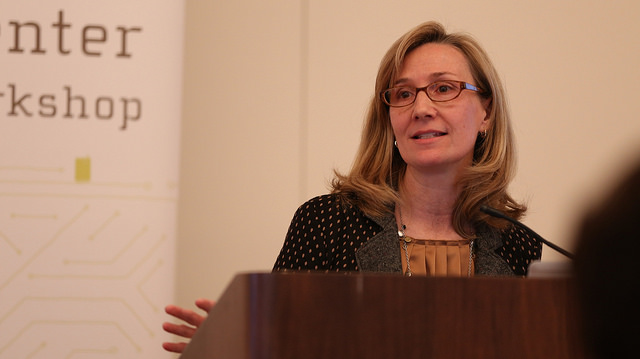 Debra Sanchez, CPB, spoke about the implications for mobile: when parents hand their devices off to their kids, they are essentially opting out of this experience.
Debra Sanchez, CPB, spoke about the implications for mobile: when parents hand their devices off to their kids, they are essentially opting out of this experience.
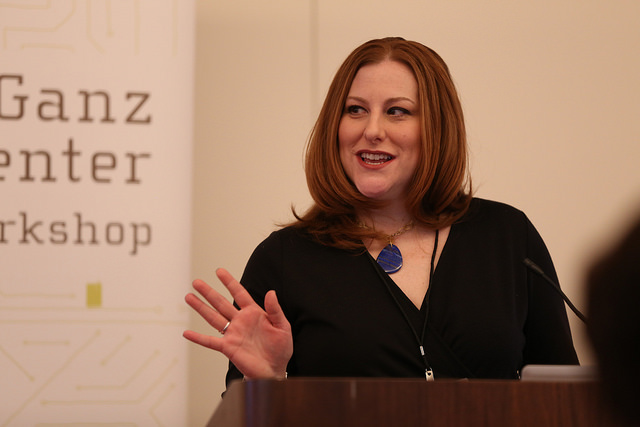
.@tocaboca says if you want kids to engage with ed media content, introduce before it becomes required school subject #familiesandmedia
— masha turchinsky (@masha_tee) January 24, 2014
Activate parent groups in school environment to engage together and learn together with children abt apps and games. #familiesandmedia
— Cooney Center (@CooneyCenter) January 24, 2014
Sandra Calvert – better engage teachers in interpreting results of #familiesandmedia data. @CooneyCenter @j_millstone
— Cooney Center (@CooneyCenter) January 24, 2014
Use report to partner with schools & teachers to make mobile products for extended learning at home (during snow days!). #familiesandmedia
— Cooney Center (@CooneyCenter) January 24, 2014
<3 Andrea Taylor’s comment: Learning at home as a new kind of Snow Day! #familiesandmedia #partnership turn snow days into days of learning
— Dr. Alice Wilder (@alicewilder) January 24, 2014
David Kleeman, SVP of Insights at PlayCollective, offered a provocative commentary on the quality of media available to kids as “educational,” and pointed out that many children find educational value and meaning in content that may not be explicitly designed as such.
David Kleeman, @playcollective reminds us “We make meaning from media based on our own needs” @CooneyCenter #familiesandmedia
— masha turchinsky (@masha_tee) January 24, 2014
Educational media content producers must help parents understand the teaching philosophy behind product. @davidkleeman #familiesandmedia
— Classroom, Inc. (@ClassroomInc) January 24, 2014
Audience responds to “provocateurs” that challenge our research data & expand its reach. #familiesandmedia pic.twitter.com/SIZhtQWAMX
— Cooney Center (@CooneyCenter) January 24, 2014
Seeta Pai from Common Sense Media discussed findings around parents choices and the evaluation of media products. She mentioned their ratings for parents, and graphite.org, their new ratings site for educators.
The demographic differences in parent responses are what we should be looking at more closely. – Seeta Pai @CommonSense #familiesandmedia
— Cooney Center (@CooneyCenter) January 24, 2014
Melina Bellows of National Geographic Kids shared her experience in making science facts fun to learn, and provided us all with the factoid that none of us will forget:
How cool facts become learning… RT @buckleit: “A cockroach can live w/out head” says @Natgeo #familiesandmedia pic.twitter.com/dUHC87ezgN
— David Kleeman (@davidkleeman) January 24, 2014
A stat from the report that surprised many in the audience: very few parents surveyed think of Minecraft as educational.
Seeta Pai from @CommonSense – #minecraft got the highest rating for learning, but parents didn’t think this was true. #familiesandmedia
— Jason Yip (@jasoncyip) January 24, 2014
More support and encouragement for rallying teachers in learning together with dig media from @ellengalinsky #familiesandmedia
— Cooney Center (@CooneyCenter) January 24, 2014
Our Shelley Pasnik w/ @CooneyCenter friends today, discussing new report: http://t.co/KmMy7uoyr7 #familiesandmedia
— Center Children&Tech (@cct_edc) January 24, 2014
Support and encouragement for teachers to “learn together” with dig media from @ellengalinsky #familiesandmedia pic.twitter.com/llM1SIDw5x
— Cooney Center (@CooneyCenter) January 24, 2014
Lewis Bernstein @SesameWorkshop says if we can’t make learning exp deep, fun, engaging then we’re at a loss #familiesandmedia @CooneyCenter
— Anna Ly (@annakimly) January 24, 2014
The creator of educational children’s media & our founder, Joan Ganz Cooney! #familiesandmedia pic.twitter.com/4M3kgUUcW5
— Anna Ly (@annakimly) January 24, 2014
Lisa Guernsey moderated the second session of the day to discuss some of the ethnic and socioeconomic findings of the report, and the issues of access and equity.
.@LisaGuernsey reminds us of a massive reading deficiency in the US. Over 2/3 of 4th graders not at grade level. #familiesandmedia
— Celia Alicata (@CeliaAlicata) January 24, 2014
Unpacking some of the stats and findings around low-income communities #familiesandmedia use. @LisaGuernsey pic.twitter.com/UUmOr99ZOu
— Cooney Center (@CooneyCenter) January 24, 2014
Vicki Katz speaking about imp of media (esp TV) to help immigrants integrate into new culture. #familiesandmedia pic.twitter.com/wg6ppxC4Iy
— Cooney Center (@CooneyCenter) January 24, 2014
Use of smartphones for banking in low-income families-implication for making high-qual mobile media for kids? -Vicki Katz #familiesandmedia
— Cooney Center (@CooneyCenter) January 24, 2014
Many here say educ. media must also be “fun”; I disagree – must be *engaging*. Dealing w/tough issues not always fun. #familiesandmedia
— David Kleeman (@davidkleeman) January 24, 2014
Need to look at ecosystem of learning at home, impact on media use by kids& parents. -Kevin Clark #familiesandmedia pic.twitter.com/rDFNq03Dm8
— Cooney Center (@CooneyCenter) January 24, 2014
KevinClark – how home-learning ecosystem connects to transmedia. (And snow days!) #familiesandmedia
— Cooney Center (@CooneyCenter) January 24, 2014
Hispanic families spent more time in joint media engagement than other minority groups in our research – Lori Takeuchi #familiesandmedia
— Cooney Center (@CooneyCenter) January 24, 2014
“44% of screen media 2 to 10yr-olds use is considered educational by their parents” But is it? #FamiliesAndMedia http://t.co/dWzQd2g0jy
— Amy Jussel (@ShapingYouth) January 24, 2014
The mobile device for many people is a “lifeline” 43% of Latino families used mobile through joint media engagement #familiesandmedia
— Jason Yip (@jasoncyip) January 24, 2014
Context studies of family use of media done by @cct_edc dives deeper into @CooneyCenter findings #familiesandmedia pic.twitter.com/FIvfEjvLUN
— Cooney Center (@CooneyCenter) January 24, 2014
Need new strategies for collecting ethnographic research on quality of media lower income kids buy/are given by @buckleit #familiesandmedia
— Cooney Center (@CooneyCenter) January 24, 2014
Free apps come w advertisements v paid content has none. What effect does this have for under served kids? #familiesandmedia @CooneyCenter
— Tech Kids Unlimited (@TechKidsU) January 24, 2014
Need to clarify for #familiesandmedia – I am not against curriculum based media, just when that is all that’s offered. Pt. 1 of 2…
— David Kleeman (@davidkleeman) January 24, 2014
Yes, under-served kids need curriculum-based media to catch up, but if it isn’t relevant, they’ll tune out. #familiesandmedia pt 2 of 2…
— David Kleeman (@davidkleeman) January 24, 2014
Robert Torres @gatesfoundation underscoring dearth of literacy products in #edtech Courseware Challenge to address. #familiesandmedia
— Classroom, Inc. (@ClassroomInc) January 24, 2014
Home/school connection to bridge digital divide – @robjtorres #familiesandmedia pic.twitter.com/RR9pmB6BbW
— Cooney Center (@CooneyCenter) January 24, 2014
We know @sesamestreet is effective for learning, but to be successful in #edmedia you need content and distribution #familiesandmedia
— Jason Yip (@jasoncyip) January 24, 2014
We have debates about funding public broadcasting, but we never talk about defunding children’s #edmedia @sesamestreet #familiesandmedia
— Jason Yip (@jasoncyip) January 24, 2014
Survey: Kids’ educational media diets still dominated by TV http://t.co/C0tD4rtxTW via @usatoday
— Cooney Center (@CooneyCenter) January 24, 2014
The Jetsons taught us everything we needed to know about technology! Spend money on children, media & learning? #familiesandmedia
— Tech Kids Unlimited (@TechKidsU) January 24, 2014
Ed Greene – need to develop professional learning initiatives to scale ind projects in local communities. #familiesandmedia
— Cooney Center (@CooneyCenter) January 24, 2014
Creator of reading rainbow discusses distribution #familiesandmedia #levarburtonrocks #throwback pic.twitter.com/FrBLnQLXkS
— Anna Ly (@annakimly) January 24, 2014
Patty Miller fr Clinton Found, working with @HillaryClinton to find tech game-changer w/parents. #familiesandmedia pic.twitter.com/dpQ4Ocso5u
— Cooney Center (@CooneyCenter) January 24, 2014
Where are the studies on the evidence of learning in iPad apps, & how to get this info to families? -Michelle Riconscente #familiesandmedia
— Cooney Center (@CooneyCenter) January 24, 2014
Dale Kunkel discusses how we could transform educational media by adding a $.01/day to education funding. #familiesandmedia #onepennymore
— David Kleeman (@davidkleeman) January 24, 2014
Melvin Ming, CEO of Sesame Workshop, introduced FCC Commissioner Jessica Rosenworcel.
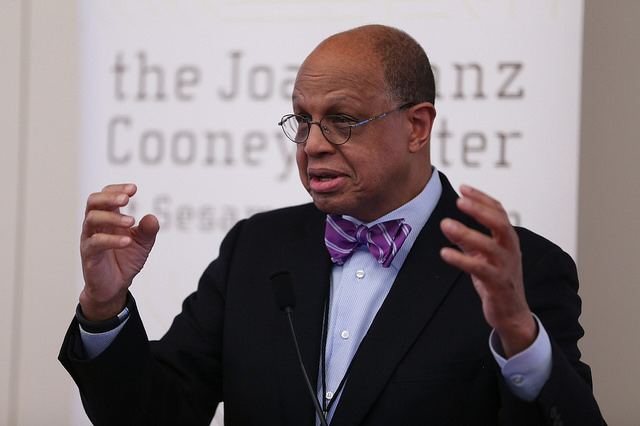
“From parenting to policy making …” FCC commissioner Jessica Rosenworcel connects #familiesandmedia research to national implementation.
— Cooney Center (@CooneyCenter) January 24, 2014
Commissioner Jessica Rosenworcel of the FCC delivered the keynote address. You can read her remarks here.
Dream big and think about scale – esp to address drop in ed media use by older kids. #familiesandmedia pic.twitter.com/7PmmtRiS2I
— Cooney Center (@CooneyCenter) January 24, 2014
Rosenworcel – the question is not will kids learn from new, digital media; they will. The question is what they can learn. #familiesandmedia
— David Kleeman (@davidkleeman) January 24, 2014
FCC commissioner’s phone “usually works” — so use it says Rosenworcel#familiesandmedia
— Warren Buckleitner (@buckleit) January 24, 2014
The final session wrapped up the Forum by gathering action items to create change in digital media and access for all children.
Action items from #familiesandmedia event-use today’s talent to make change in digital media products & access. pic.twitter.com/Lb3w6jTCMl
— Cooney Center (@CooneyCenter) January 24, 2014
Dale Riehl notes that need great content cr8tion & dist channel. We have both but channel is a bottleneck #familiesandmedia @CooneyCenter
— Anna Ly (@annakimly) January 24, 2014
We’re thrilled to see that the report has been covered by a variety of news outlets:
- Screen Time Study Finds Education Drop-Off | New York Times
- 2 to 4 year olds are most frequent users of educational media, study finds | Washington Post
- Do tablets teach? Parents see mobile devices as underachievers, study finds. | Christian Science Monitor
- Survey: Kids’ educational media diets still dominated by TV | USA Today
- Cooney study leaves new questions for educational media creators | Kidscreen
- How Do Parents Think ‘Educational’ Screen Time Affects Learning? | Mind/Shift
- 8 Surprising Facts About How Kids Learn From Screen Time | Forbes

